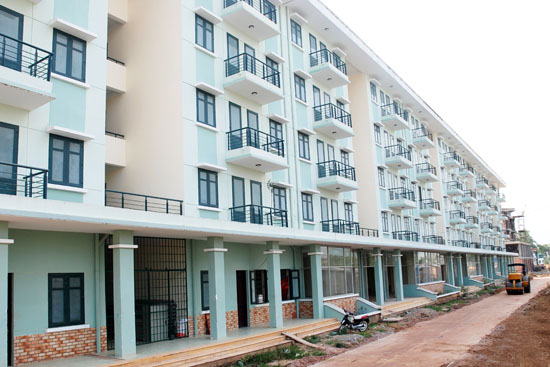On November 11, 2016, the Government of Vietnam issued Decree No. 149/2016/ND-CP amending and supplementing several articles of Decree No. 177/2013/ND-CP dated November 14, 2013, of the Government of Vietnam stipulating details and providing guidance on implementing certain articles of the Law on Prices. The new decree not only addresses the existing issues but also includes detailed provisions and guidance on implementing certain articles of the Law on Prices and Article 24 of the Law on Fees and Charges regarding price stabilization; state pricing; price negotiation; inspection of factors forming prices; price declaration; price listing; state management authority in the field of pricing; and the national database on prices, etc.
Amendment Upon Practical Requirements
On November 14, 2013, the Government of Vietnam promulgated Decree No. 177/2013/ND-CP providing detailed regulations and guidelines for the implementation of several articles of the Law on Pricing. Effective from January 1, 2014, after more than 2 years of implementation, the regulations of this Decree have yielded many results, promptly meeting the requirements of price management and administration at both the central and local levels under the market mechanism with state regulation.
Based on that, the Ministry of Finance and the People’s Committees of the provinces have issued several legal documents guiding the implementation of Decree No. 177/2013/ND-CP as per their authority.
Thanks to this legal document system on pricing being issued promptly, the price management and administration have been consistently and uniformly implemented from the central to the local level.
Price management and stabilization have been effectively carried out, ensuring the objectives of inflation control, macroeconomic stability, and social security; especially during periods with significant price fluctuations (such as during holidays and Tet lunar new year); the prices of essential goods such as gasoline, fixed-route passenger transport fares, milk for children under 6 years old... have been effectively and synchronously implemented.
Furthermore, the State's pricing work has clearly delineated the authority and responsibility for pricing various goods and services on the State pricing list to the ministries and central authorities, provincial People's Committees.
The buying and selling of goods and services at prices regulated by the State have contributed to combating waste and saving costs for the state budget, preventing unreasonable price increases, causing damage to consumers, and reducing unfair competition on prices…
The inspection and examination of the implementation of laws on pricing, taxes, and fees have been intensified annually; thus identifying and strictly handling violations of market management laws, pricing management laws, tax, and fee laws, and publicly announcing them through mass media, contributing to market price stability.
Other price management activities such as price negotiation and price database have also been effectively implemented. The pricing negotiation work since the Decree came into effect has mainly been carried out at the local level according to decentralization and led by the Department of Finance, conducting price negotiations in accordance with the prescribed procedures without any proposals for central-level price negotiation.

Illustrative Image (source: internet)
Regarding the price database, this is a critical national database to promptly serve state management work on pricing, macroeconomic administration, price regulation... Implementing the authority assigned under Decree No. 177/2013/ND-CP, the Ministry of Finance issued Circular No. 142/2015/TT-BTC on September 4, 2015, regulating the national database on prices to uniformly guide principles for building, connecting, managing, and using the national price database and the price database with the participation of related ministries, central authorities, and local authorities, organizations, and individuals.
However, at the end of 2015, the National Assembly passed the Law on Fees and Charges, which took effect from January 1, 2017, stipulating that 17 types of fees listed under the List of Fees and Charges attached to the Ordinance on Fees and Charges would be administered under a pricing mechanism set by the State, and the Government of Vietnam was assigned specific duties to determine the pricing authority and pricing methods.
This regulation requires the issuance of a Decree defining the pricing authority and pricing methods for products and services transitioning from fees to state-regulated service pricing.
The regulation on the State's pricing authority and methods has already been stipulated in Decree No. 177/2013/ND-CP. If the same content is regulated in two Decrees, it would lead to a lack of focus, and various levels and sectors would find it difficult to monitor and implement.
Furthermore, Decree No. 177/2013/ND-CP reveals some shortcomings regarding the authority and responsibility of state management agencies at various levels in providing guidance and organizing the implementation of price stabilization measures, pricing, price declaration...
In general, after more than 2 years of enforcement, Decree No. 177/2013/ND-CP has promptly fulfilled the requirements for price management and administration at the central and local levels under a market mechanism with state regulation.
However, the practical implementation of the Decree also reveals some inadequacies regarding the authority and responsibility of state management agencies at various levels in guiding and organizing the implementation of price stabilization measures, pricing, price declaration... hence, amendments are needed.
Enhancing Management Efficiency, Following Market Trend
According to Decree No. 149/2016/ND-CP, during the period when the State applies the price registration measure to stabilize prices of specific items listed under the price stabilization goods and services list, production and business organizations and individuals implement price registration starting from the effective date of the price registration measure decided by the competent authority, and before setting or adjusting the prices of goods and services by submitting the Price Registration Form to the competent state authority.
The cases of price registration include: Production and business organizations and individuals engaging only in wholesale shall register wholesale prices; Enterprises engaging in both wholesale and retail activities shall register both wholesale and retail prices; Importing enterprises and exclusive distributors shall register the proposed wholesale and retail prices; Exclusive distributors shall register wholesale, retail, or proposed retail prices; General agents entitled to decide and adjust prices shall register wholesale, retail, or proposed retail prices; Agents entitled to decide and adjust prices shall register retail prices; The price registration for table salt, rice, and ordinary rice (excluding farmers and salt farmers) shall be carried out by production and business organizations and individuals of these products.
In cases where production and business organizations directly purchase table salt from salt farmers or ordinary rice from farmers, they must register the buying prices of table salt from salt farmers and the buying prices of ordinary rice from farmers.
Additionally, the management of milk prices is highly emphasized in the new Decree. According to Decree No. 149/2016/ND-CP, monitoring and supervising the price stabilization of milk for children under 6 years old is no longer the responsibility of the Ministry of Finance.
Instead, the Ministry of Health shall lead, in cooperation with the Ministry of Industry and Trade, to guide the detailed milk product list for children under 6 years old. This milk price registration at the central level will be received and reviewed by the Ministry of Industry and Trade; the Ministry of Industry and Trade will lead, in cooperation with relevant ministries and central authorities, to propose to the Government of Vietnam decisions on price registration; specific pricing, maximum prices, minimum prices, and price frameworks for milk products for children under 6 years old to implement price stabilization.
Moreover, the Decree supplements local authority pricing regulations by the Provincial People's Council, which includes: Health care service prices at state medical examination and treatment facilities (excluding health insurance examination and treatment services as prescribed by health insurance law) and sending the price decisions to the Ministry of Health and the Ministry of Finance for state management purposes; public preschool and general education service prices (tuition fees).
Furthermore, the new regulation grants the provincial-level People's Committees the authority to determine: Land prices; land rental prices, water surface rental prices; forest prices, including production forests, protection forests, and special-use forests owned by the public with the State as the representative owner; rental, lease-purchase prices for social housing, service houses constructed with state budget investment; selling or rental prices for state-owned housing as prescribed by housing law; domestic clean water prices; rental prices for state-owned assets being infrastructure works invested by local budget; public service product prices, professional public service prices, and other goods and services ordered or assigned for production and business using local budget according to legal regulations.
Simultaneously, the provincial-level People's Committees also prescribe the specific prices for: Public irrigation utility products managed locally; measurement and cadastral mapping services in case of new land allocation, land lease or change in the use purpose of household land in areas without cadastral maps with coordinates; market stall, and parking space service charges invested by the state budget resources.
Additionally, they prescribe the maximum prices for: Road usage services managed locally for road construction projects for business; ferry services invested by non-state budget funds managed locally; market stall, and parking space service charges invested by non-state budget funds; solid waste treatment services funded by state budget; household waste collection, and transportation services funded by state budget.
Price frameworks for ferry service charges with state budget investment managed locally; port and station usage services (including bridge, wharf, mooring services, container handling services, pilotage services within the port area) managed locally; port and station usage services (including inland water ports and fish ports) invested by state budget, managed locally.
Subsidy levels, transportation subsidy levels for goods under the subsidy list funded by local and central budgets; retail price levels or price frameworks for subsidized goods; transportation fares for the supply of essential goods and services under the subsidy list for highland, remote, and island communities; Prices of other goods and services following specialized laws and regulations are also assigned to the provincial-level People's Committees and city governments to issue.
Additionally, the Decree specifies that the central government price management agencies include the Ministry of Finance and sectoral management ministries; the local price management agencies include the provincial Departments of Finance responsible for building a price database system to serve state management in sectoral and local fields.
The Ministry of Finance is responsible for building a national price database center. The national price database center connects with price database systems of ministries and central authorities and localities; provides price information to serve state management tasks and as required by organizations and individuals under the legal framework.
The national price database content includes: Prices of goods and services set by the State; Prices of goods and services under the price registration, price declaration list; Market prices of goods and services under the market price report list as regulated by the Ministry of Finance; Market prices of other essential goods and services serving forecasting and state management on prices; Relevant information on price appraisal: Pricing appraisal enterprises, price appraisers, examination and card management of price appraisers, information on the value of appraised assets, and other information as stipulated by pricing and appraisal law; State management documents on prices and summarized reports; Other information serving price management as mandated by law.
The Ministry of Finance is responsible for constructing, exploiting, and operating the national price database ensuring compatibility and connectivity with price database systems of various ministries, sectors, localities, and related organizations and individuals; Guiding the collection, update, and provision of price and price appraisal information for constructing the national price database to meet state management requirements and as demanded by organizations and individuals per legal regulations; implementing data confidentiality policies in the national price database under legal regulations; Cooperating with relevant ministries, central authorities, and local entities to connect, share, and provide information within the national price database scope; Leading specific guidelines for constructing, exploiting, and managing the national price database.
Concerning some specially regulated goods and services priced by the State with specific characteristics and detailed technical specifications managed by sectoral ministries, while the Ministry of Finance collaborates and supervises to ensure state management functions in the field of pricing by the Ministry of Finance as stipulated under the Law on Pricing.
The pricing authority and responsibility of ministers of ministries are specified to ensure efficiency and practicality in managing sectors and fields of ministries and central authorities; ensuring compliance with sector-specific laws.
Decree No. 149/2016/ND-CP is effective from January 1, 2017, abolishing Clause 3, Article 3, and Point e, Clause 2, Article 7 of Decree No. 177/2013/ND-CP dated November 14, 2013, of the Government of Vietnam providing detailed regulations and guidelines for the implementation of several articles of the Law on Pricing.
Source: Financial Magazine
 Article table of contents
Article table of contents









